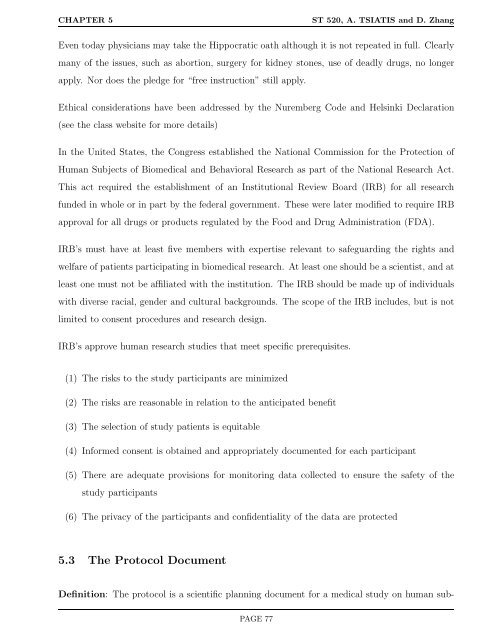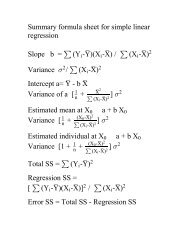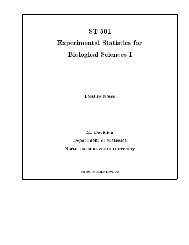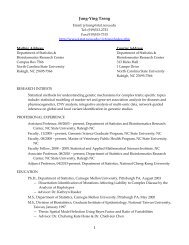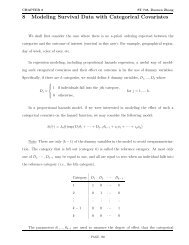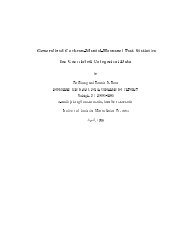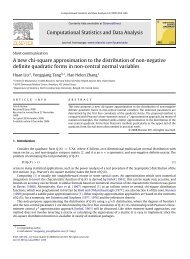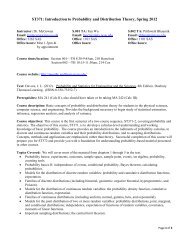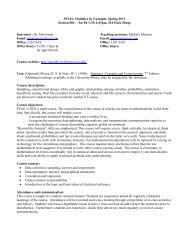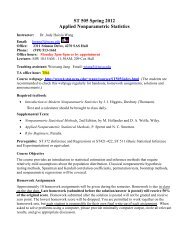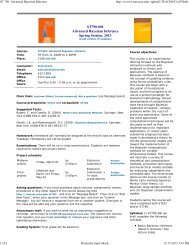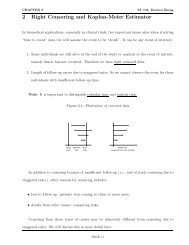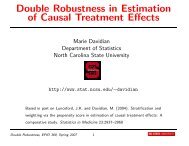ST 520 Statistical Principles of Clinical Trials - NCSU Statistics ...
ST 520 Statistical Principles of Clinical Trials - NCSU Statistics ...
ST 520 Statistical Principles of Clinical Trials - NCSU Statistics ...
Create successful ePaper yourself
Turn your PDF publications into a flip-book with our unique Google optimized e-Paper software.
CHAPTER 5 <strong>ST</strong> <strong>520</strong>, A. TSIATIS and D. Zhang<br />
Even today physicians may take the Hippocratic oath although it is not repeated in full. Clearly<br />
many <strong>of</strong> the issues, such as abortion, surgery for kidney stones, use <strong>of</strong> deadly drugs, no longer<br />
apply. Nor does the pledge for “free instruction” still apply.<br />
Ethical considerations have been addressed by the Nuremberg Code and Helsinki Declaration<br />
(see the class website for more details)<br />
In the United States, the Congress established the National Commission for the Protection <strong>of</strong><br />
Human Subjects <strong>of</strong> Biomedical and Behavioral Research as part <strong>of</strong> the National Research Act.<br />
This act required the establishment <strong>of</strong> an Institutional Review Board (IRB) for all research<br />
funded in whole or in part by the federal government. These were later modified to require IRB<br />
approval for all drugs or products regulated by the Food and Drug Administration (FDA).<br />
IRB’s must have at least five members with expertise relevant to safeguarding the rights and<br />
welfare <strong>of</strong> patients participating in biomedical research. At least one should be a scientist, and at<br />
least one must not be affiliated with the institution. The IRB should be made up <strong>of</strong> individuals<br />
with diverse racial, gender and cultural backgrounds. The scope <strong>of</strong> the IRB includes, but is not<br />
limited to consent procedures and research design.<br />
IRB’s approve human research studies that meet specific prerequisites.<br />
(1) The risks to the study participants are minimized<br />
(2) The risks are reasonable in relation to the anticipated benefit<br />
(3) The selection <strong>of</strong> study patients is equitable<br />
(4) Informed consent is obtained and appropriately documented for each participant<br />
(5) There are adequate provisions for monitoring data collected to ensure the safety <strong>of</strong> the<br />
study participants<br />
(6) The privacy <strong>of</strong> the participants and confidentiality <strong>of</strong> the data are protected<br />
5.3 The Protocol Document<br />
Definition: The protocol is a scientific planning document for a medical study on human sub-<br />
PAGE 77


